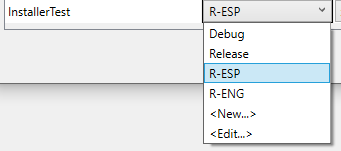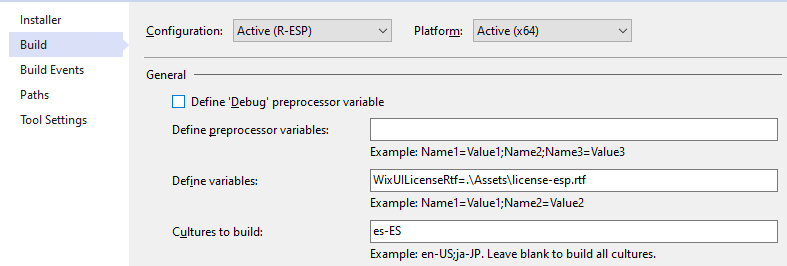There is another way to do this, and although it is a bit messy it is less messy than the two workarounds the OP has mentioned. And credit where credit is due, this answer is almost 100% based on this post http://weblogs.sqlteam.com/mladenp/archive/2010/04/15/WiX-3-Tutorial-Custom-EULA-License-and-MSI-localization.aspx by Mladen Prajdić.
The following is based on WiX 3.5.
You create a slightly modified copy of the LicenseAgreementDlg dialog and include it in your project.
<?xml version="1.0" encoding="UTF-8"?>
<!--
Copyright (c) Microsoft Corporation. All rights reserved.
The use and distribution terms for this software are covered by the
Common Public License 1.0 (http://opensource.org/licenses/cpl1.0.php)
which can be found in the file CPL.TXT at the root of this distribution.
By using this software in any fashion, you are agreeing to be bound by
the terms of this license.
You must not remove this notice, or any other, from this software.
-->
<!-- This is a modified version of LicenseAgreementDlg to support selection of localized versions of
the license file. It is very much based on this article:
http://sqlserverpedia.com/blog/sql-server-bloggers/wix-3-tutorial-custom-eula-license-and-msi-localization/ -->
<Wix xmlns="http://schemas.microsoft.com/wix/2006/wi">
<Fragment>
<UI>
<Dialog Id="LicenseAgreementKludge" Width="370" Height="270" Title="!(loc.LicenseAgreementDlg_Title)">
<Control Id="BannerBitmap" Type="Bitmap" X="0" Y="0" Width="370" Height="44" TabSkip="no" Text="!(loc.LicenseAgreementDlgBannerBitmap)" />
<Control Id="BannerLine" Type="Line" X="0" Y="44" Width="370" Height="0" />
<Control Id="BottomLine" Type="Line" X="0" Y="234" Width="370" Height="0" />
<Control Id="Description" Type="Text" X="25" Y="23" Width="340" Height="15" Transparent="yes" NoPrefix="yes" Text="!(loc.LicenseAgreementDlgDescription)" />
<Control Id="Title" Type="Text" X="15" Y="6" Width="200" Height="15" Transparent="yes" NoPrefix="yes" Text="!(loc.LicenseAgreementDlgTitle)" />
<Control Id="LicenseAcceptedCheckBox" Type="CheckBox" X="20" Y="207" Width="330" Height="18" CheckBoxValue="1" Property="LicenseAcceptedKludge" Text="!(loc.LicenseAgreementDlgLicenseAcceptedCheckBox)" />
<Control Id="Print" Type="PushButton" X="112" Y="243" Width="56" Height="17" Text="!(loc.WixUIPrint)">
<Publish Event="DoAction" Value="WixUIPrintEula">1</Publish>
</Control>
<Control Id="Back" Type="PushButton" X="180" Y="243" Width="56" Height="17" Text="!(loc.WixUIBack)" />
<Control Id="Next" Type="PushButton" X="236" Y="243" Width="56" Height="17" Default="yes" Text="!(loc.WixUINext)">
<Publish Event="SpawnWaitDialog" Value="WaitForCostingDlg">!(wix.WixUICostingPopupOptOut) OR CostingComplete = 1</Publish>
<Condition Action="disable"><![CDATA[LicenseAcceptedKludge <> "1"]]></Condition>
<Condition Action="enable">LicenseAcceptedKludge = "1"</Condition>
</Control>
<Control Id="Cancel" Type="PushButton" X="304" Y="243" Width="56" Height="17" Cancel="yes" Text="!(loc.WixUICancel)">
<Publish Event="SpawnDialog" Value="CancelDlg">1</Publish>
</Control>
<Control Id="LicenseText" Type="ScrollableText" X="20" Y="60" Width="330" Height="140" Sunken="yes" TabSkip="no">
<Text SourceFile="$(var.ProjectDir)\!(loc.LicenseRtf)" /> <!-- this value has been modified -->
</Control>
</Dialog>
</UI>
</Fragment>
</Wix>
In your main WiX source file you add the following code to "patch" your new dialog into the dialog sequencing instead of the original one:
<Publish Dialog="WelcomeDlg" Control="Next" Event="NewDialog" Value="LicenseAgreementKludge">1</Publish>
<Publish Dialog="LicenseAgreementKludge" Control="Back" Event="NewDialog" Value="WelcomeDlg">1</Publish>
<Publish Dialog="LicenseAgreementKludge" Control="Next" Event="NewDialog" Value="InstallDirDlg">LicenseAcceptedKludge = "1"</Publish>
<Publish Dialog="InstallDirDlg" Control="Back" Event="NewDialog" Value="LicenseAgreementKludge">1</Publish>
Note that this is based on using the WixUI_InstallDir dialog collection - for other collections, such as WixUI_Mondo, you will probably have to modify the above by looking at the source.
Finally, in each of your localization files you place one line like this:
<String Id="LicenseRtf">en-us\MerliniaSMSGatewayLicense.en-us.rtf</String>
<String Id="LicenseRtf">da-dk\MerliniaSMSGatewayLicense.da-dk.rtf</String>
And, of course, you place the localized license file as indicated. I'm placing the license files (and localization files) in subfolders, but this is not necessary.
Like I said, it's a bit messy, but it does work.


